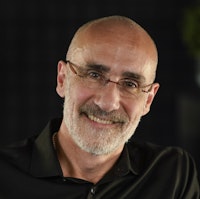
The best cure for anxiety is taking care of others.
Show Notes
Looking around and experiencing the suffering and injustice in the world can make it difficult to believe that happiness exists. But the Judeo-Christian tradition teaches that it’s sinful to succumb to despair, and we have a responsibility to ourselves and others to try and find our way through dark times. On the other hand, when you avoid suffering, you avoid meaning, and therefore, you avoid happiness, says professor and author Arthur Brooks. One of the great secrets of happiness, he says, is unhappiness. Emerging from the pandemic, spiritual and intellectual leaders may have a lot to offer us about rebuilding our lives into something better and more meaningful, and Brooks joins writer Pico Iyer for this on-stage conversation about navigating the complex waters of making healthy life choices. Drawing on the teachings of the Dalai Lama and many other religious practitioners, Brooks and Iyer wind through loss and emptiness, opportunity and purpose, and biology and psychology. Each thread brings them back to the ongoing challenge of taking control of one’s mental state and landing at a destination full of life and intention.
Explore
Related episodes


We try our whole lives to avoid pain and suffering and when it does show up, we try to solve it. In her new book, No Cure for Being Human, religious scholar Kate Bowler says we try to out-eat, out-learn, and out-perform our humanness. Truth is, bad things do happen to good people and if we're going to tell the truth, we need one another. As someone who lives with cancer, B...


So much of adult life is about learning the rules and then using those rules to navigate the world. We become certain that we know what we know — that we’re right, and we’re safer and more secure that way. But certainty, argues neuroscientist Beau Lotto, might actually be one of society’s biggest sources of emotional and physical unwellness. Certainty causes us to have les...


Are we experiencing a “crisis of connection"?” Fifty-four percent of American adults report that not a single person knows them well. Our political and social divisions are at the forefront of public life right now, and distrust is widespread. New York Times columnist David Brooks is on a mission to spread the skills of deep listening and engaged conversation, which lead t...


For many people, the COVID-19 pandemic lockdown became an unexpected opportunity to take stock of our relationships. Some friendships deepened and transformed, some slipped away, and many social circles shrank. Which isn’t always a bad thing.








